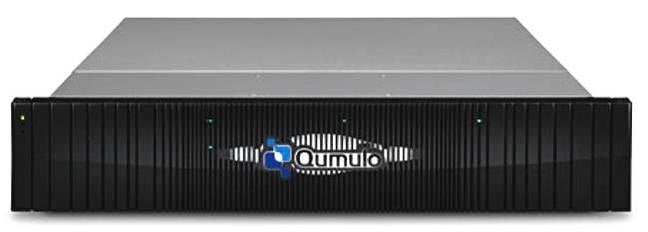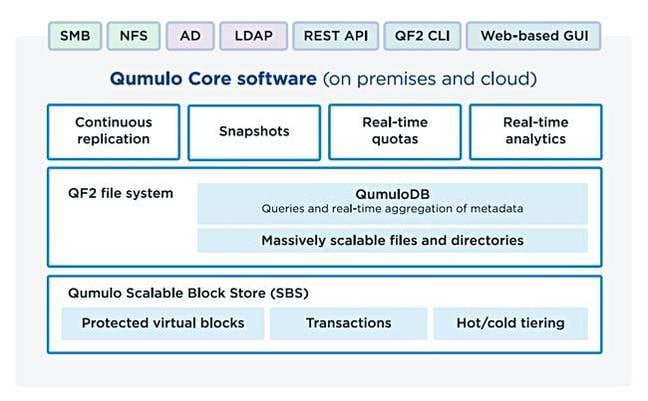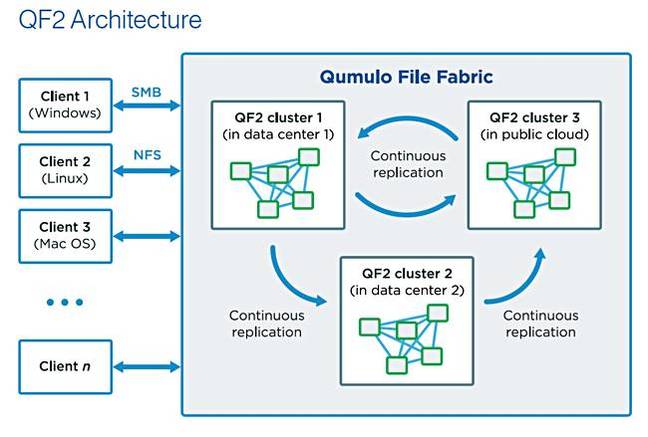This article is more than 1 year old
Qumulo goes all-flash and replicates to AWS
Scale-out on-premises filer can burst processing to Amazon
Scale-out file start up Qumulo has revealed all-flash filer nodes.
The all-flash QF2 (Qumulo File Fabric) P-series node joins its QC hardware with its hybrid flash and disk media drives.
The P-series' hardware design is straightforward enough: it's a 2U Intel box that can run up to 24 NVMe SSDs in U.2 format, dual Xeon Skylake Gold-level 6126 processors and 192GB (12 x 16GB) of RAM. The networking interface cards are dual 100GbitE or 40GbitE QSFP+ NICs, with separate front-end and back-end data paths.
Power supplies are fully-redundant.

Qumulo P-series
The latest Qumulo Core software delivers continuous replication and supports AWS as a replication target that is synchronised to a source cluster. It has a REST API interface.
There are two models; the 23T is a 23TB model with 12 x 1.92TB SSDs while the 92T has a 92TB capacity using 24 x 3.84TB SSDs. The drives use 3bits/cell (TLC) 3D NAND.
There are a minimum of four nodes in a cluster. A node delivers 4GB/sec of bandwidth, hence a 4-node set provides 16GB/sec, and a 400-node set pumps out 1.6TB/sec. Qumulo says the system copes with both single-stream (video-editing) and multi-stream requirements.
It scales to billions of files and, Qumulo says, can handle small file workloads as well as large file applications.

Qumulo Core software
The QF2 software can run in the AWS public cloud as well as on the on-premises QF2 nodes. An on-premises cluster can continuously replicate data to another on-premises cluster or to AWS so that AWS QF2 instances can be fired up when a burst of additional processing power is needed beyond available on-premises capabilities.

Qumulo Core SW replication
The system management provides real-time visibility and control of system performance, with analytics focussing down to the file level when trouble-shooting. Cloud-based monitoring of the filer cluster can detect an oncoming SSD failure and alert customers and provides historical trend data.
Qumulo expects to sell all-flash QF2s into the machine learning applications, genomic sequencing and analysis, high-resolution video editing and scientific computing markets. They all have a need for fast performance processing of file-based workloads, including large-scale datasets.
Peter Godman, Qumulo's co-founder and CTO, said; “Using QF2, our customers will sequence more genomes, create more special effects and train more learning models across all-flash and the public cloud.”
The company claims QF2 all-flash clusters deliver the best price performance of any all-flash file storage system available today. It has hundeds of customers, including DreamWorks.
+Reg Comment
The HPC scale-out filer product space is getting rather crowded.Dell EMC has refreshed Isilon and Panasas has introduced new kit, and SW-only companies like Elastifile, Rozo and WekaIO, not forgetting IBM with Spectrum Scale and Red Hat with Ceph.
HPE, lacking its own in-house scale-out filer, is partnering far and wide, with DDN, Qumulo, and WekaIO.
Qumulo's P-series products are available with subscription pricing, not that we have seen any prices yet. ®
